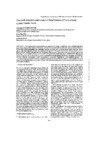Identificador persistente para citar o vincular este elemento:
https://accedacris.ulpgc.es/jspui/handle/10553/1784
| Título: | Rare earth minerals in carbonatites of basal complex of Fuerteventura (Canary Islands, Spain) | Autores/as: | Mangas, José Torrado, FJP Reguilón, R. M. Martín Izard, Agustín |
Clasificación UNESCO: | Investigación | Palabras clave: | Minas y recursos mineros Canarias Fuerteventura |
Fecha de publicación: | 1997 | Publicación seriada: | Mineral Deposits: Research And Exploration, Where Do They Meet? | Conferencia: | 4th Biennial SGA Meeting on Mineral Deposits - Research and Exploration: Where do They Meet | Resumen: | The Fuerteventura calciocarbonatites appear in the Basal Complex as veins, breccias and shear bands along the coastline between Puerto de la Pena and Cueva de Lobos, and in the area around the Barranco of Esquinzo. These carbonatites are essentially made up of calcite and to a lesser extent apatite, aegirine-augite, albite, orthoclase-sanidine, biotite, ore minerals and epidote with accessory minerals such as sphene, zircon, garnet, celestite, barite, britholite, allanite, pyrochlore and monazite. Geochemical analysis of these carbonatites show high values of REE of between 511 and 7,372 ppm with a high relation of LREE/HREE. Microprobe studies reveal that these elements are mainly associated with phosphates (britholite, monazite, and apatite), silicates (allanite and titanite), oxides (pyrochlore), carbonates (bastnaesite) and sulphates (barite). The carbonatites were generated in the last magmatic-hydrothermal crystallization phases of the alkaline intrusive complexes of Fuerteventura and some of them were emplaced along shear zones showing important plastic deformation structures. | URI: | https://accedacris.ulpgc.es/handle/10553/1784 | ISBN: | 90-5410-889-4 | Fuente: | Mineral Deposits: Research And Exploration, Where Do They Meet?, p. 475-478 |
| Colección: | Actas de congresos |
Citas de WEB OF SCIENCETM
Citations
2
actualizado el 25-feb-2024
Visitas
483
actualizado el 16-ene-2026
Descargas
1.181
actualizado el 16-ene-2026
Google ScholarTM
Verifica
Altmetric
Comparte
Exporta metadatos
Los elementos en ULPGC accedaCRIS están protegidos por derechos de autor con todos los derechos reservados, a menos que se indique lo contrario.
